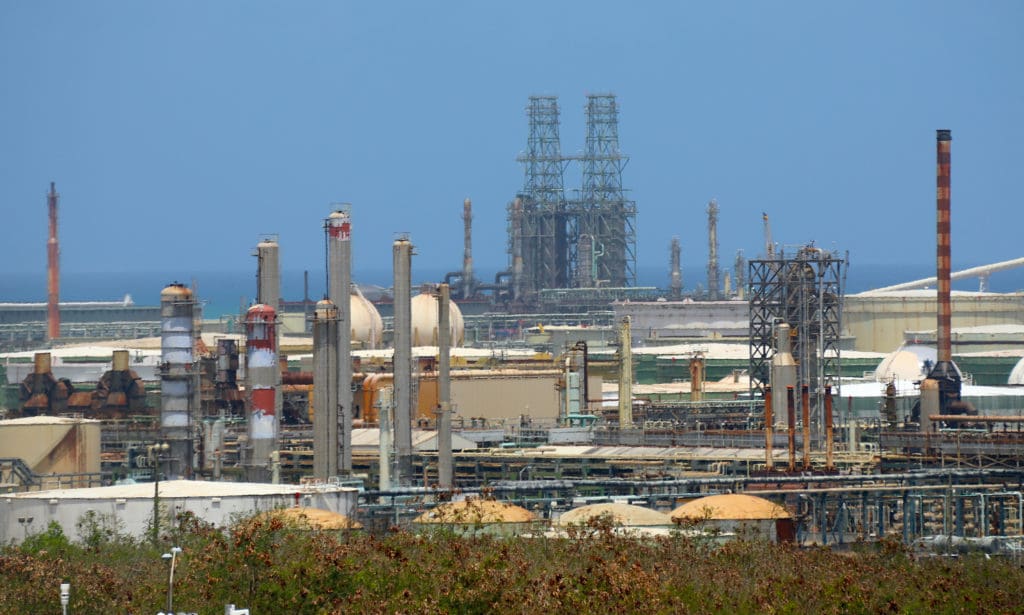
In their first statement since acquiring the bankrupt Limetree Bay Refinery for $62 million at auction on Dec. 18, executives with West Indies Petroleum said they’ll restart the facility with a focus on environmental responsibility and a plan to eventually produce 450,000 barrels of oil per day.
The statement, released on Friday, gives the first glimpse of the Jamaica-based company’s goals for the troubled facility it acquired in a joint bid with Port Hamilton Refining and Transportation. WIPL has until Jan. 21 to close the sale that took place in the United States Bankruptcy Court for the Southern District of Texas and was approved by Judge David Jones. Should the sale fall through, St. Croix Energy has been declared the backup bidder at a cost of $57 million.
The refinery encountered numerous problems since its restart by Limetree in February after being shuttered in 2012 by former owner Hovensa following several years of heavy losses. Hovensa declared bankruptcy in 2015. In May, the Environmental Protection Agency ordered it shut down for 60 days due to toxic emissions that affected scores of neighboring properties. In June, Limetree announced it was closing indefinitely, and in July declared bankruptcy.
West Indies Petroleum “is reiterating its commitment to successfully close the sale and pursue major strategic investment in the refinery,” according to Friday’s statement. “WIPL is also committed to being sensitive to environmental considerations in its operation of the facility that is widely regarded among stakeholders as a landmark and the largest of its kind in the Western Hemisphere,” it said.
While some failed bidders in the bankruptcy court auction had hoped to acquire the refinery on the south shore of St. Croix for scrap, West Indies Petroleum said Friday it plans to ramp up production to more than double the current operating capacity.
The refinery “has storage/operating capacity that is multiple times that of refineries across the region including Jamaica’s state-owned oil refinery, Petrojam. The Limetree Bay Refinery’s operating capacity is 220,000 barrels per day. This compared to Petrojam’s capacity, which is reportedly approximately 30,000 barrels per day and a refinery in Suriname, which operates at approximately 15,000 barrels per day,” the statement said. “WIPL intends to increase Limetree Bay’s operating capacity to approximately 450,000-barrels per day.”
The company said Limetree Bay Refinery invested approximately $4 billion in upgrading and modernizing the facility, and that its investment in the plant will eventually assist in reducing energy costs, in particular on St Croix where the refinery has been upgraded to use LPG as its source of power generation. The refinery’s capacity presents significant opportunities for St. Croix and the region, it said.
Chief Executive Officer Charles Chambers said that “no doubt we are committed to and confident about successfully closing out the sale and moving towards maximizing the potential benefits that this refinery may have on improving not just local or regional but also global energy security.”
“Quite apart from the economic boost to St. Croix via the significant foreign direct investment and job creation which our investment will naturally bring, it’s important to note that given the distinct comparative advantage which its strategic location facilitates, our winning bid and attendant proposed major investment in the Limetree Bay Refinery have significantly raised the prospects of WIPL leveraging its footprints by supporting in a major way the energy requirements of a raft of countries including Puerto Rico, Trinidad and Tobago, Jamaica and sections of the United States,” said Chambers.
Senior Vice President Danville Walker described the winning bid and accompanying strategic investment plans as “potentially game changing, not only for St. Croix, Jamaica and the region but a host of countries across the globe.”
Walker, a former commissioner of Customs and director of Elections in Jamaica, said ultimately, “if the support of policymakers is had, WIPL will hope to use the refinery to, over the medium to long term, create an environment that augurs well for the reduction in electricity costs in several countries.”
Walker, who also in the past served as chairman of the Natural Resources Conservation Authority in Jamaica, said, “to be very clear WIPL is fully aware of past environmental mishaps which occurred during the operation of the Limetree Bay Refinery in its previous proprietary dispensation and our proposed operation of the mega-facility will not only see us seeking not to repeat errors made but also being mindful of the prescriptions and mandate of the Environmental Protection Agency which is a United States federal government agency whose mission is to protect human and environmental health.”
The energy company plans to fully engage the EPA as it moves to close the bid and pursue the potentially trail blazing investment in the Limetree Bay Refinery on St. Croix, he said.
The EPA has declined to commit ahead of time what it would require of a new owner to allow the troubled refinery to restart using Limetree’s existing permits. Bidders especially want to know how much they will need to invest in new control technologies to comply with the federal Clean Air Act, an opinion the EPA decides on a case-by-case basis.


